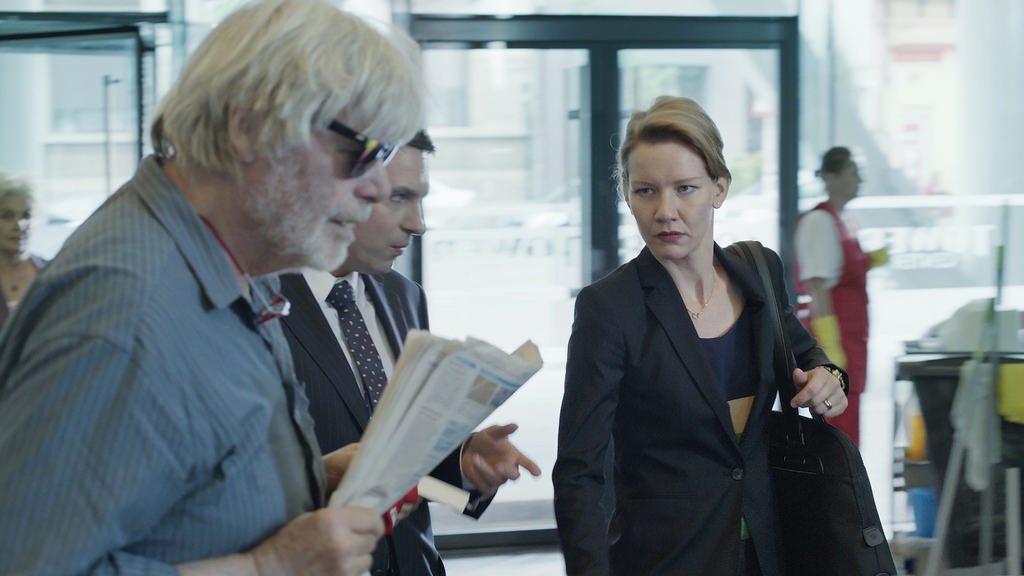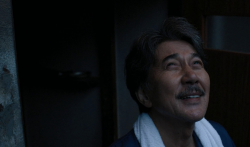German director Maren Ade’s Toni Erdmann is one of the boldest films of the year. Built on witty dialogue, bombastic set pieces, and great performances by its lead actors, it is a truly unique film. Toni Erdmann is a comedy/drama focusing on the relationship of a father trying to reconnect with his daughter. The film was nominated for Best Foreign Film at the Golden Globes, and it proves worthy of that distinction. Ade does an excellent job of creating an absurdity in the pedestrian setting of a white-collar workplace. The film is weird and wonderful, equal parts hilarious and touching.
Winfried (Peter Simonischek), a music teacher, lives alone with only his dog, his mother, and his sardonic sense of humor to keep him company. He harasses delivery men by telling them that he’s put a bomb in the package, and jokes that he’s been hired by an old-folks home to scare the patients to death. The jokes cover up a lonely interior that longs for his distant daughter Ines (Sandra Hüller). Winfried’s daughter is the polar opposite of her father: ambitious, pragmatic and sober. Ines works far from Winfried in Bucharest, and her absence is so conspicuous that Winfried boasts that he has taken to hiring a substitute daughter. His loneliness compounds when his dog dies and his music student cancels lessons. Fed up with never seeing Ines, Winfried concocts a plan to spend more time with her that involves posing as a life coach named Toni Erdmann for one of her clients.
Maren Ade, Simonischek, and Hüller all do a great job shifting between comedy and drama. In a particular scene, Ines is forced to sing “The Greatest Love of All” by Whitney Houston in front of a room of strangers. The lyrics “the children are our future” are so on-the-nose and the singing by Ines so over the top that one can’t help but laugh. But when Ines fails to acquiesce to her father’s silly lifestyle, Winfried’s disappointment is palpable. Ade deserves immense credit for being able to so seamlessly marry such conflicting themes. Winfried and Ines serve as great foils to each other. They approach the same problem in radically different ways: Ines is always businesslike while Winfried is joking at every turn. Ines seems incapable or unwilling to see that her career is draining her of happiness while Winfried is oblivious to how upsetting his antics can be. This disconnect between Ines and Winfried is painfully apparent at times. At one point, Ines plans to show Winfried a palace in Bucharest but takes him to the mall instead when one of her clients needs help shopping. Winfried’s forlorn expression perfectly encapsulates the central theme of two characters who need to save each other from the loneliness of ordinary life.
Toni Erdmann is ultimately about a father teaching his daughter to take life a bit less seriously. Ines is in a world that only values facts and figures. She sees the potential layoff of hundreds of workers as the cost of doing business. Hüller portrays the character as one that does actually care but has been forced not to. She always appears to be a bit uncomfortable and uneasy. It is up to Winfried to show her a happier way of being. He himself is truly unhappy, but he covers it up with constant joking. Simonischek lets the audience see the unhappiness with an expression as grave as the jokes are lively. His daughter’s unhappiness bothers him immensely, and it leaves him with no option but to teach her how to be happy again.
It’s a testament to Simonischek and Hüller that they manage to make this relationship work so well. Simonischek in particular does a tremendous job of injecting every scene with a zaniness that elevates the mundane setting. His crazy costumes and absurd accents are so off the cuff and unexpected that every gag lands with hilarious results. The viewer is left on the edge of their seat wondering what stunt he will pull next. However when he is absent, the film suffers. Another weakness is the movie’s length. At 2 hours, 42 minutes, watching this movie should not be a spontaneous decision. Toni Erdmann often finds itself caught up in a fairly extraneous plotline regarding the details of Ines’ consulting job–a plot somehow more boring than it sounds. Too many scenes focus their attention here, and it causes the film to drag. Getting past the length may be difficult for some, but it is well worth the time. Toni Erdmann is not a film to be missed.





